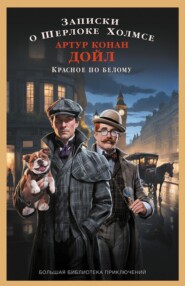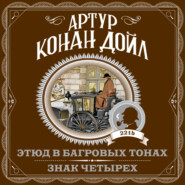По всем вопросам обращайтесь на: info@litportal.ru
(©) 2003-2025.
✖
Rodney Stone
Настройки чтения
Размер шрифта
Высота строк
Поля
"I won't even tell my uncle. I'll say she was ill, the poor lady! it's enough that we should have seen her in her shame, without its being the gossip of the village. It makes me feel sick and heavy at heart."
"She was so yesterday, Jim."
"Was she? I never marked it. But I know that she has kind eyes and a kind heart, for I saw the one in the other when she looked at me. Maybe it's the want of a friend that has driven her to this."
It blighted his spirits for days, and when it had all gone from my mind it was brought back to me by his manner. But it was not to be our last memory of the lady with the scarlet pelisse, for before the week was out Jim came round to ask me if I would again go up with him.
"My uncle has had a letter," said he. "She would speak with me, and I would be easier if you came with me, Rod."
For me it was only a pleasure outing, but I could see, as we drew near the house, that Jim was troubling in his mind lest we should find that things were amiss.
His fears were soon set at rest, however, for we had scarce clicked the garden gate before the woman was out of the door of the cottage and running down the path to meet us. She was so strange a figure, with some sort of purple wrapper on, and her big, flushed face smiling out of it, that I might, if I had been alone, have taken to my heels at the sight of her. Even Jim stopped for a moment as if he were not very sure of himself, but her hearty ways soon set us at our ease.
"It is indeed good of you to come and see an old, lonely woman," said she, "and I owe you an apology that I should give you a fruitless journey on Tuesday, but in a sense you were yourselves the cause of it, since the thought of your coming had excited me, and any excitement throws me into a nervous fever. My poor nerves! You can see for yourselves how they serve me."
She held out her twitching hands as she spoke. Then she passed one of them through Jim's arm, and walked with him up the path.
"You must let me know you, and know you well," said she. "Your uncle and aunt are quite old acquaintances of mine, and though you cannot remember me, I have held you in my arms when you were an infant. Tell me, little man," she added, turning to me, "what do you call your friend?"
"Boy Jim, ma'am," said I.
"Then if you will not think me forward, I will call you Boy Jim also. We elderly people have our privileges, you know. And now you shall come in with me, and we will take a dish of tea together."
She led the way into a cosy room – the same which we had caught a glimpse of when last we came – and there, in the middle, was a table with white napery, and shining glass, and gleaming china, and red– cheeked apples piled upon a centre-dish, and a great plateful of smoking muffins which the cross-faced maid had just carried in. You can think that we did justice to all the good things, and Miss Hinton would ever keep pressing us to pass our cup and to fill our plate. Twice during our meal she rose from her chair and withdrew into a cupboard at the end of the room, and each time I saw Jim's face cloud, for we heard a gentle clink of glass against glass.
"Come now, little man," said she to me, when the table had been cleared. "Why are you looking round so much?"
"Because there are so many pretty things upon the walls."
"And which do you think the prettiest of them?"
"Why, that!" said I, pointing to a picture which hung opposite to me. It was of a tall and slender girl, with the rosiest cheeks and the tenderest eyes – so daintily dressed, too, that I had never seen anything more perfect. She had a posy of flowers in her hand and another one was lying upon the planks of wood upon which she was standing.
"Oh, that's the prettiest, is it?" said she, laughing. "Well, now, walk up to it, and let us hear what is writ beneath it."
I did as she asked, and read out: "Miss Polly Hinton, as 'Peggy,' in The Country Wife, played for her benefit at the Haymarket Theatre, September 14th, 1782."
"It's a play-actress," said I.
"Oh, you rude little boy, to say it in such a tone," said she; "as if a play-actress wasn't as good as any one else. Why, 'twas but the other day that the Duke of Clarence, who may come to call himself King of England, married Mrs. Jordan, who is herself only a play-actress. And whom think you that this one is?"
She stood under the picture with her arms folded across her great body, and her big black eyes looking from one to the other of us.
"Why, where are your eyes?" she cried at last. "I was Miss Polly Hinton of the Haymarket Theatre. And perhaps you never heard the name before?"
We were compelled to confess that we never had. And the very name of play-actress had filled us both with a kind of vague horror, like the country-bred folk that we were. To us they were a class apart, to be hinted at rather than named, with the wrath of the Almighty hanging over them like a thundercloud. Indeed, His judgments seemed to be in visible operation before us when we looked upon what this woman was, and what she had been.
"Well," said she, laughing like one who is hurt, "you have no cause to say anything, for I read on your face what you have been taught to think of me. So this is the upbringing that you have had, Jim – to think evil of that which you do not understand! I wish you had been in the theatre that very night with Prince Florizel and four Dukes in the boxes, and all the wits and macaronis of London rising at me in the pit. If Lord Avon had not given me a cast in his carriage, I had never got my flowers back to my lodgings in York Street, Westminster. And now two little country lads are sitting in judgment upon me!"
Jim's pride brought a flush on to his cheeks, for he did not like to be called a country lad, or to have it supposed that he was so far behind the grand folk in London.
"I have never been inside a play-house," said he; "I know nothing of them."
"Nor I either."
"Well," said she, "I am not in voice, and it is ill to play in a little room with but two to listen, but you must conceive me to be the Queen of the Peruvians, who is exhorting her countrymen to rise up against the Spaniards, who are oppressing them."
And straightway that coarse, swollen woman became a queen – the grandest, haughtiest queen that you could dream of – and she turned upon us with such words of fire, such lightning eyes and sweeping of her white hand, that she held us spellbound in our chairs. Her voice was soft and sweet, and persuasive at the first, but louder it rang and louder as it spoke of wrongs and freedom and the joys of death in a good cause, until it thrilled into my every nerve, and I asked nothing more than to run out of the cottage and to die then and there in the cause of my country. And then in an instant she changed. She was a poor woman now, who had lost her only child, and who was bewailing it. Her voice was full of tears, and what she said was so simple, so true, that we both seemed to see the dead babe stretched there on the carpet before us, and we could have joined in with words of pity and of grief. And then, before our cheeks were dry, she was back into her old self again.
"How like you that, then?" she cried. "That was my way in the days when Sally Siddons would turn green at the name of Polly Hinton. It's a fine play, is Pizarro."
"And who wrote it, ma'am?"
"Who wrote it? I never heard. What matter who did the writing of it! But there are some great lines for one who knows how they should be spoken."
"And you play no longer, ma'am?"
"No, Jim, I left the boards when – when I was weary of them. But my heart goes back to them sometimes. It seems to me there is no smell like that of the hot oil in the footlights and of the oranges in the pit. But you are sad, Jim."
"It was but the thought of that poor woman and her child."
"Tut, never think about her! I will soon wipe her from your mind. This is 'Miss Priscilla Tomboy,' from The Romp. You must conceive that the mother is speaking, and that the forward young minx is answering.
And she began a scene between the two of them, so exact in voice and manner that it seemed to us as if there were really two folk before us: the stern old mother with her hand up like an ear-trumpet, and her flouncing, bouncing daughter. Her great figure danced about with a wonderful lightness, and she tossed her head and pouted her lips as she answered back to the old, bent figure that addressed her. Jim and I had forgotten our tears, and were holding our ribs before she came to the end of it.
"That is better," said she, smiling at our laughter. "I would not have you go back to Friar's Oak with long faces, or maybe they would not let you come to me again."
She vanished into her cupboard, and came out with a bottle and glass, which she placed upon the table.
"You are too young for strong waters," she said, "but this talking gives one a dryness, and – "
Then it was that Boy Jim did a wonderful thing. He rose from his chair, and he laid his hand upon the bottle.
"Don't!" said he.
She looked him in the face, and I can still see those black eyes of hers softening before the gaze.
"Am I to have none?"
"Please, don't."
With a quick movement she wrested the bottle out of his hand and raised it up so that for a moment it entered my head that she was about to drink it off. Then she flung it through the open lattice, and we heard the crash of it on the path outside.
"There, Jim!" said she; "does that satisfy you? It's long since any one cared whether I drank or no."
"You are too good and kind for that," said he.
"Good!" she cried. "Well, I love that you should think me so. And it would make you happier if I kept from the brandy, Jim? Well, then, I'll make you a promise, if you'll make me one in return."
"She was so yesterday, Jim."
"Was she? I never marked it. But I know that she has kind eyes and a kind heart, for I saw the one in the other when she looked at me. Maybe it's the want of a friend that has driven her to this."
It blighted his spirits for days, and when it had all gone from my mind it was brought back to me by his manner. But it was not to be our last memory of the lady with the scarlet pelisse, for before the week was out Jim came round to ask me if I would again go up with him.
"My uncle has had a letter," said he. "She would speak with me, and I would be easier if you came with me, Rod."
For me it was only a pleasure outing, but I could see, as we drew near the house, that Jim was troubling in his mind lest we should find that things were amiss.
His fears were soon set at rest, however, for we had scarce clicked the garden gate before the woman was out of the door of the cottage and running down the path to meet us. She was so strange a figure, with some sort of purple wrapper on, and her big, flushed face smiling out of it, that I might, if I had been alone, have taken to my heels at the sight of her. Even Jim stopped for a moment as if he were not very sure of himself, but her hearty ways soon set us at our ease.
"It is indeed good of you to come and see an old, lonely woman," said she, "and I owe you an apology that I should give you a fruitless journey on Tuesday, but in a sense you were yourselves the cause of it, since the thought of your coming had excited me, and any excitement throws me into a nervous fever. My poor nerves! You can see for yourselves how they serve me."
She held out her twitching hands as she spoke. Then she passed one of them through Jim's arm, and walked with him up the path.
"You must let me know you, and know you well," said she. "Your uncle and aunt are quite old acquaintances of mine, and though you cannot remember me, I have held you in my arms when you were an infant. Tell me, little man," she added, turning to me, "what do you call your friend?"
"Boy Jim, ma'am," said I.
"Then if you will not think me forward, I will call you Boy Jim also. We elderly people have our privileges, you know. And now you shall come in with me, and we will take a dish of tea together."
She led the way into a cosy room – the same which we had caught a glimpse of when last we came – and there, in the middle, was a table with white napery, and shining glass, and gleaming china, and red– cheeked apples piled upon a centre-dish, and a great plateful of smoking muffins which the cross-faced maid had just carried in. You can think that we did justice to all the good things, and Miss Hinton would ever keep pressing us to pass our cup and to fill our plate. Twice during our meal she rose from her chair and withdrew into a cupboard at the end of the room, and each time I saw Jim's face cloud, for we heard a gentle clink of glass against glass.
"Come now, little man," said she to me, when the table had been cleared. "Why are you looking round so much?"
"Because there are so many pretty things upon the walls."
"And which do you think the prettiest of them?"
"Why, that!" said I, pointing to a picture which hung opposite to me. It was of a tall and slender girl, with the rosiest cheeks and the tenderest eyes – so daintily dressed, too, that I had never seen anything more perfect. She had a posy of flowers in her hand and another one was lying upon the planks of wood upon which she was standing.
"Oh, that's the prettiest, is it?" said she, laughing. "Well, now, walk up to it, and let us hear what is writ beneath it."
I did as she asked, and read out: "Miss Polly Hinton, as 'Peggy,' in The Country Wife, played for her benefit at the Haymarket Theatre, September 14th, 1782."
"It's a play-actress," said I.
"Oh, you rude little boy, to say it in such a tone," said she; "as if a play-actress wasn't as good as any one else. Why, 'twas but the other day that the Duke of Clarence, who may come to call himself King of England, married Mrs. Jordan, who is herself only a play-actress. And whom think you that this one is?"
She stood under the picture with her arms folded across her great body, and her big black eyes looking from one to the other of us.
"Why, where are your eyes?" she cried at last. "I was Miss Polly Hinton of the Haymarket Theatre. And perhaps you never heard the name before?"
We were compelled to confess that we never had. And the very name of play-actress had filled us both with a kind of vague horror, like the country-bred folk that we were. To us they were a class apart, to be hinted at rather than named, with the wrath of the Almighty hanging over them like a thundercloud. Indeed, His judgments seemed to be in visible operation before us when we looked upon what this woman was, and what she had been.
"Well," said she, laughing like one who is hurt, "you have no cause to say anything, for I read on your face what you have been taught to think of me. So this is the upbringing that you have had, Jim – to think evil of that which you do not understand! I wish you had been in the theatre that very night with Prince Florizel and four Dukes in the boxes, and all the wits and macaronis of London rising at me in the pit. If Lord Avon had not given me a cast in his carriage, I had never got my flowers back to my lodgings in York Street, Westminster. And now two little country lads are sitting in judgment upon me!"
Jim's pride brought a flush on to his cheeks, for he did not like to be called a country lad, or to have it supposed that he was so far behind the grand folk in London.
"I have never been inside a play-house," said he; "I know nothing of them."
"Nor I either."
"Well," said she, "I am not in voice, and it is ill to play in a little room with but two to listen, but you must conceive me to be the Queen of the Peruvians, who is exhorting her countrymen to rise up against the Spaniards, who are oppressing them."
And straightway that coarse, swollen woman became a queen – the grandest, haughtiest queen that you could dream of – and she turned upon us with such words of fire, such lightning eyes and sweeping of her white hand, that she held us spellbound in our chairs. Her voice was soft and sweet, and persuasive at the first, but louder it rang and louder as it spoke of wrongs and freedom and the joys of death in a good cause, until it thrilled into my every nerve, and I asked nothing more than to run out of the cottage and to die then and there in the cause of my country. And then in an instant she changed. She was a poor woman now, who had lost her only child, and who was bewailing it. Her voice was full of tears, and what she said was so simple, so true, that we both seemed to see the dead babe stretched there on the carpet before us, and we could have joined in with words of pity and of grief. And then, before our cheeks were dry, she was back into her old self again.
"How like you that, then?" she cried. "That was my way in the days when Sally Siddons would turn green at the name of Polly Hinton. It's a fine play, is Pizarro."
"And who wrote it, ma'am?"
"Who wrote it? I never heard. What matter who did the writing of it! But there are some great lines for one who knows how they should be spoken."
"And you play no longer, ma'am?"
"No, Jim, I left the boards when – when I was weary of them. But my heart goes back to them sometimes. It seems to me there is no smell like that of the hot oil in the footlights and of the oranges in the pit. But you are sad, Jim."
"It was but the thought of that poor woman and her child."
"Tut, never think about her! I will soon wipe her from your mind. This is 'Miss Priscilla Tomboy,' from The Romp. You must conceive that the mother is speaking, and that the forward young minx is answering.
And she began a scene between the two of them, so exact in voice and manner that it seemed to us as if there were really two folk before us: the stern old mother with her hand up like an ear-trumpet, and her flouncing, bouncing daughter. Her great figure danced about with a wonderful lightness, and she tossed her head and pouted her lips as she answered back to the old, bent figure that addressed her. Jim and I had forgotten our tears, and were holding our ribs before she came to the end of it.
"That is better," said she, smiling at our laughter. "I would not have you go back to Friar's Oak with long faces, or maybe they would not let you come to me again."
She vanished into her cupboard, and came out with a bottle and glass, which she placed upon the table.
"You are too young for strong waters," she said, "but this talking gives one a dryness, and – "
Then it was that Boy Jim did a wonderful thing. He rose from his chair, and he laid his hand upon the bottle.
"Don't!" said he.
She looked him in the face, and I can still see those black eyes of hers softening before the gaze.
"Am I to have none?"
"Please, don't."
With a quick movement she wrested the bottle out of his hand and raised it up so that for a moment it entered my head that she was about to drink it off. Then she flung it through the open lattice, and we heard the crash of it on the path outside.
"There, Jim!" said she; "does that satisfy you? It's long since any one cared whether I drank or no."
"You are too good and kind for that," said he.
"Good!" she cried. "Well, I love that you should think me so. And it would make you happier if I kept from the brandy, Jim? Well, then, I'll make you a promise, if you'll make me one in return."

















